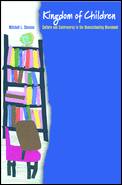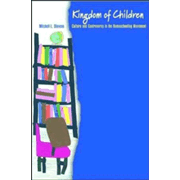Unlike any other books written about homeschooling, Kingdom of Children is an outsider's analysis of the movement based upon about ten years of first-hand research. It is a history of the movement, its organizations, and developments rather than a description of homeschooling itself. Author, Mitchell Stevens, identifies himself with the liberal-leaning academic world, but he strives hard for objectivity in this study of a "world" that largely differs from him in philosophical outlook.
I suspect the book will be of particular interest to those, like me, who have been a part of those homeschooling organizations and developments. The book reads sort of like a family history, dirty laundry and all. Stevens occasionally exhibits some misperceptions on minor things; for example, he seems to make a strong differentiation between curriculum used by those he calls "believers" and those he calls "inclusives," contrasting the extremes of Christian Liberty type programs with unschooling, while missing the middle ground where I find most homeschoolers. He also sometimes loses his objectivity in his slanted treatment of conservative leaders such as Mary Pride and Michael Farris. ( I would have loved to see equally negative treatment given to the most radical representatives of the inclusive side of homeschooling.) But, overall, Stevens has done his homework very well considering the breadth and diversity of homeschooling. I was very pleasantly surprised by his insight and conclusions.
Two areas Stevens addresses struck me as particularly important: the efficacy of different organizational structures and the ways that homeschool moms find personal fulfillment and purpose in their roles.
Stevens researched the organizational structures of both believer and inclusive organizations. He concluded that most believer organizations tend to be hierarchical with strong leadership and agendas often coming from the top down. On the other hand, inclusive organizations tend to be very democratic, seeking consensus from all involved before proceeding. While sympathetic to the goals of the inclusives, Stevens points out that such organizations often "cripple" themselves with their inability to actually accomplish things in contrast to believer organizations. By trying to accommodate everyone, they tend to reach agreement on very little beyond a general support for home education. Consequently, believers much more easily control the "political" end of homeschooling with strong communication networks, leaders, and volunteers ready and willing to support a shared agenda.
The second area, homeschool moms, also reflected differences Stevens found between believer and inclusive moms in relation to strong cultural support for feminist ideals. While feminists have pushed for women's independence and self-fulfillment, homeschooling seems to take women the opposite direction. Stevens understands, at least to some extent, how believers see homeschooling as self-fulfillment and how it helps women develop a sense of importance and usefulness. He also points out how many home businesses have provided such women with additional forms of self-expression and fulfillment. In addition, Stevens raises the conflict posed by societal attitudes toward children—attitudes that support child-centered methods of parenting that cater to a child's wishes. Believers, typically, reject such child-centeredness.
On the other hand, Stevens sees some ideological confusion in the inclusive world where child-centered parenting has to compete with strong feminist inclinations. If a homeschooling family is trying to equally accommodate both children and mothers, one would expect there to be a number of problems—how much self-sacrifice should a mom be willing to do for her child when it interferes with her own fulfillment? Interestingly, Stevens observes that the inclusive world tends to ignore the dilemma by focusing almost exclusively upon children.
Kingdom of Children is a fascinating analysis of what's happened thus far in the homeschooling world, but, more importantly, it raises issues that both homeschooling families and organizations should be studying if they hope to succeed in the future.










